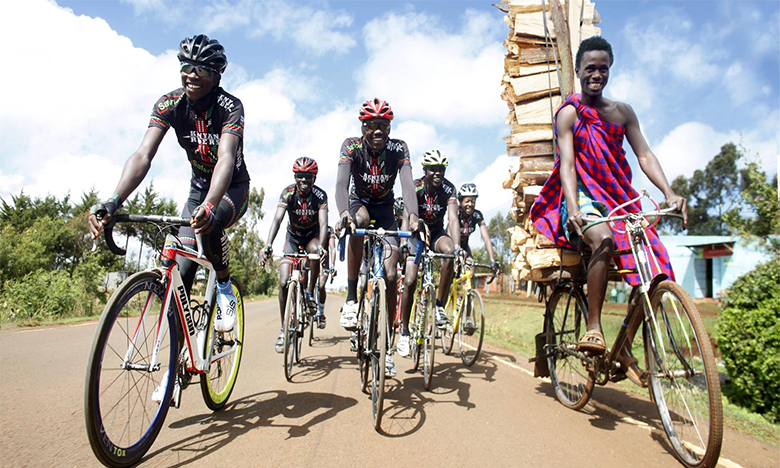Ten cyclists riding single-speed “black mamba” bikes shot forward, beginning the ascent up one of the steepest hills in Iten, Kenya, which sits at 8,000 feet above sea level. These were trainees, high school students gunning for a spot on a pro team. Five minutes later, eight other cyclists — professionals riding race-worthy road bikes — began the same punishing climb.
The remote town of Iten has gained an international reputation as the breeding ground for Kenyan running champions like Wilson Kipsang, David Rudisha and Florence Kiplagat. Now, a ragtag crew of enthusiasts is looking to see if this region can produce stars in another sport: pro cycling. Their immediate goal is to get a handful of Kenyans into the Tour de France (currently underway). Their ultimate goal will take longer: grooming the Kenyan Riders to become the first all-Black African team to compete in cycling’s biggest race.
On this rainy May morning, the objective was attainable, if daunting: Cycle up 3,000 feet over 7 miles in less than 30 minutes. The rickety black mambas are a far cry from racing bikes, but they’re what Kenyans know.
Those on road bikes represented about half of the Kenyan Riders — a development team that hopes to send its best cyclists to the German-funded Bike Aid team, which itself aims to get African athletes into the Tour de France. At least three Kenyan Riders expect to make it: Suleiman Kangangi, Salim Kipkemboi and Geoffrey Langat. “I have a dream that in the future, we’re going to make cycling like how running is in Kenya,” Langat, a 26-year-old with a slight frame and surprising power, said after the race.
"THERE’S NO REASON PHYSICALLY THAT A KENYAN CANNOT MATCH A EUROPEAN CYCLIST."
On the black mambas, Rashid Kosgei was among the first to break into the lead. “Rashid was awkward and showed almost no sign of talent when he started coming with his brother,” said Ciarán Fitzpatrick, the team’s mild-mannered Irish coach, as he trailed his riders in a car. “He’s far better than what I expected when I first saw him, which I suppose is a lesson.”
But that day’s lesson was for the Kenyan Riders, none of whom beat the 30-minute target by the end of the race. They made their way back to the training camp, weary and deflated.
“I think they can get to the top; there’s no reason physically that a Kenyan cannot match a European cyclist,” Fitzpatrick says. He’s willing to concede that the team lags behind in terms of hard skills and tactics, but “for the amount of power they can output for certain lengths of time, we’re not far behind.”
Nicholas Leong, the Singaporean who started the Kenyan Riders team, first came to Kenya in 2005, following a group of Kenyan runners who had competed in the Singapore Marathon. He was working as a commercial photographer, but cycling was his obsession since childhood. Over time, he became fixed on the question of whether the genetic gifts and elevation training that makes Kenyans superhuman runners could translate to cycling. “I wondered why cycling was just the last sport to become inclusive,” he says.
At the time, Kenya had nothing resembling a biking culture — as opposed to Europe, where pro cyclists are known to say they started riding soon after taking their first steps. Leong’s method for finding talent was unorthodox. A heavy guy, he would stand at the bottom of an especially steep hill and ask one of the local bike-taxi guys to deliver him to the top as fast as possible. “And I would time them,” Leong says with a half-smile.
“The thing that wins you the Tour de France is being able to climb, and a climbing specialist is built like a Kenyan marathon runner,” he explains. But most Kenyans he met barely knew how to ride a bike.
As Leong began looking for sponsors to support a fledgling team, Fitzpatrick arrived in Iten from Ireland in 2007 to train as a runner. That career stalled, but he fell in love with the area and learned Swahili. Soon, Leong had brought him on as a cycling coach. “Nicholas figured I knew running and knew Kenya, so I could learn cycling,” Fitzpatrick says.
Assessing the task before them, Leong and Fitzpatrick are both clear-eyed and upbeat. “A team of cyclists that has an East African focus — that’s possible within the next three to five years,” says Leong. “A full Kenyan team is some ways off.”
Paul Sherwen, a seven-time Tour de France contender who’s now an expert cycling analyst for the event, agrees with that time line, noting that Chris Froome, the Tour’s three-time winner, spent most of his life in Kenya, even if he competed for the U.K. “I sincerely believe we can have a Black Kenyan rider in the Tour de France in the near future,” he says. “To get a team, the fast-track way to do it would be an East African team.”
The morning after the training race in Iten, Leong sat down for bacon and eggs with Brother Colm O’Connell, a revered local figure for having coached dozens of Kenyan runners who became Olympic gold medalists and world champions. “Don’t see potential; just be open to it,” O’Connell said.
Leong turned the conversation to the King of the Mountain race later this year in Taiwan, where he expects the grueling, uphill course would play to his team’s strengths. Even if the Tour de France dream is years off, he hopes a Kenyan Rider will bring home prize money from Taiwan — and then inspire the next Chris Froome to pick up a bike. “When people start coming back with meaningful amounts of money,” says Leong, “that’s when cycling will start catching on.”

